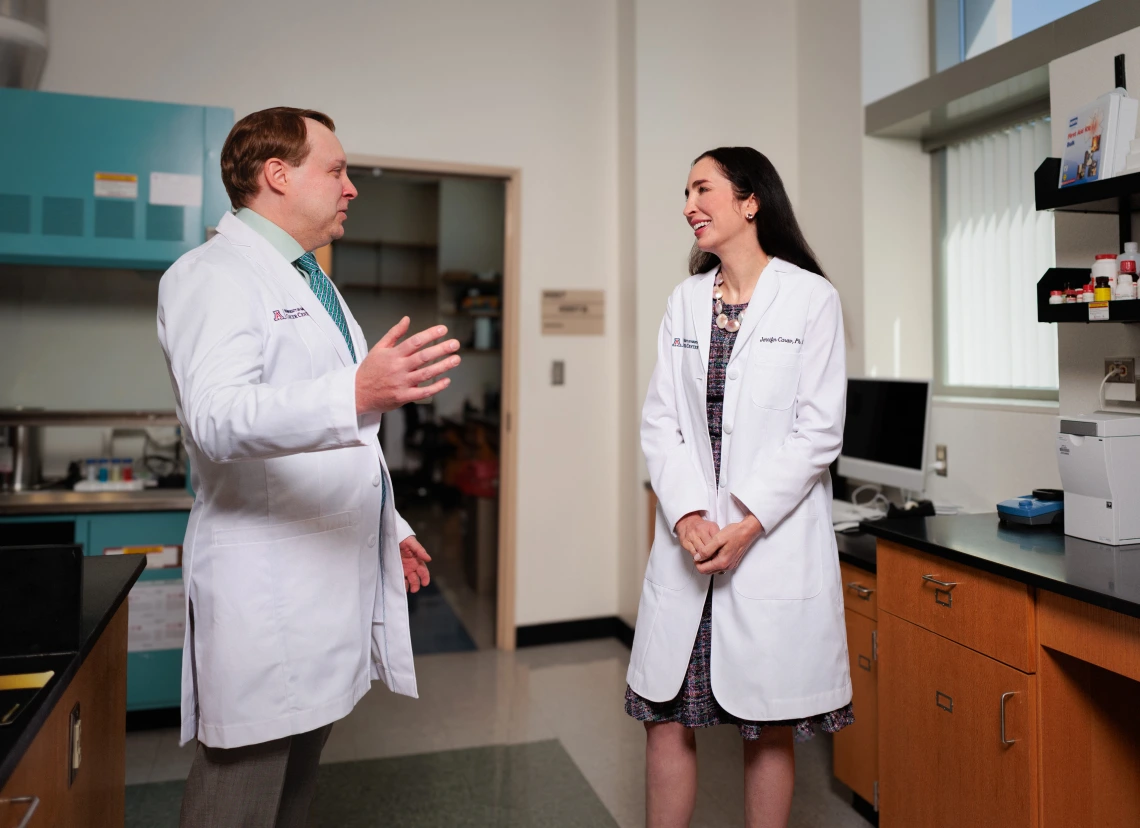U of A Cancer Center researchers identify biomarker to guide autophagy-targeted therapy in kidney cancer

Drs. Steffan Nawrocki, left, and Jennifer Carew talk in their lab in the University of Arizona Cancer Center.
Researchers at the University of Arizona Comprehensive Cancer Center have identified a novel biomarker that may predict which patients with clear cell renal cell carcinoma (ccRCC) are most likely to benefit from a targeted combination therapy involving autophagy inhibition.
In a study published in Cancer Letters, the research team found that elevated expression of a stress-response protein known as REDD1 (Regulated in Development and DNA Damage Responses 1) correlates with increased sensitivity to autophagy inhibitors. These findings could enable more personalized treatment approaches for kidney cancer by guiding the selection of patients who are most likely to respond to these therapies.
“High REDD1 expression sensitizes kidney cancer cells to autophagy inhibitors, offering a potential biomarker to predict therapeutic response,” said Steffan T. Nawrocki, PhD, professor in the Department of Medicine at the University of Arizona College of Medicine – Tucson and co-leader of the Clinical & Translational Oncology Program (CTOP) of the U of A Cancer Center. “This could be an important step toward personalizing treatment for patients with advanced renal cell carcinoma.”
ccRCC is the most common subtype of kidney cancer and accounts for roughly 75% of all renal cancer cases. While autophagy inhibitors have shown limited benefit in unstratified patient populations, the new study suggests that REDD1 may be used to identify patients most likely to respond, thereby enhancing therapeutic efficacy.
The research also explored whether REDD1 expression could be modulated pharmacologically to improve treatment outcomes. The team tested a combination of autophagy inhibitors with TP-3654, an investigational PIM kinase inhibitor currently in clinical development. In preclinical models, TP-3654 increased REDD1 levels in ccRCC cells, leading to enhanced anticancer activity when combined with autophagy inhibitors. This synergy was confirmed in vivo, where the combination treatment induced tumor regression in mouse models of ccRCC.
“Our findings demonstrate that REDD1 not only predicts response to autophagy inhibitors, but can also be pharmacologically induced to sensitize tumors,” said Jennifer S. Carew, PhD, professor in the Department of Medicine and Clinical and Translational Sciences and Director of Translational Research at the U of A Cancer Center. “This dual function makes REDD1 both a highly promising biomarker and an innovative therapeutic target.”
The research team is now pursuing retrospective analyses of patient tumor datasets to validate REDD1’s predictive utility and laying the groundwork for future prospective clinical trials.
This study was supported by grants from the National Cancer Institute of the National Institutes of Health (R01CA268383, T32CA009213, P30CA023074) and the University of Arizona Cancer Center’s Integrative Cancer Scholars – Cancer Research Training and Education Coordination fellowship.



